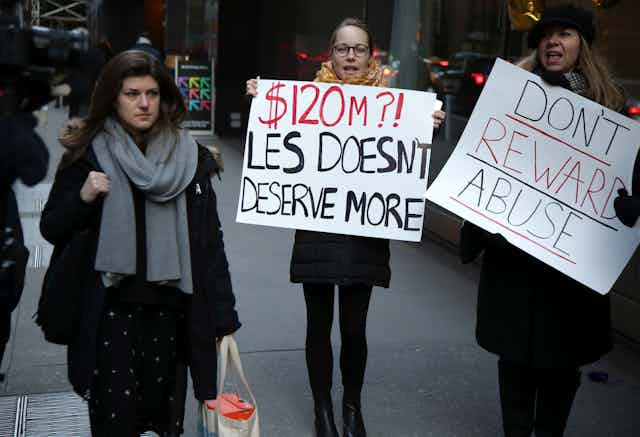Corporate America is notorious for letting disgraced CEOs walk away with millions.
Yet somehow Les Moonves, who was fired from CBS “for cause” on Dec. 17 after a monthslong investigation into his alleged misdeeds, lost US$120 million in promised severance benefits – and that’s despite the fact that his contract terms with the network were exceptionally generous.
In other words, the company was incredibly lucky Moonves’ behavior and his efforts to cover it up were so egregious. Otherwise Moonves – like so many of his fallen peers – would have walked away with a windfall.
So why does corporate America make it so easy for favored CEOs to leave under a cloud of disgrace with millions in their pocket? As a former employment lawyer, I blame the “cause” clause.
Moonves’ fall
The CBS board of directors’ decision to deny Moonves his severance followed an investigation by two high-profile law firms, which apparently included interviews with “as many as 300 people” and a 100-question voluntary survey about the workplace culture at CBS.
The board’s decision was not exactly a surprise given the regular drip of press reports about Moonves’ blurred judgment and blundered cover-up.
But the mountain of evidence against him also obscured a different problem. Moonves had a contract that meant anything short of monstrous and clumsy behavior would have enabled him to slink away with a $120 million exit package.

Finding ‘cause’
Specifically, Moonves’ contract – excerpted in the company’s public filings – entitled him to keep the severance unless he was terminated for “cause.” But “cause” was defined in a way that permitted all sorts of bad acts.
For example, while “cause” did include “conviction of a felony,” a mere indictment for a serious crime or conviction of a misdemeanor would not have been enough.
“Cause” also referenced violations of company policy – including the harassment policy. But those violations would have had to produce a “material adverse effect” on the company to qualify. That’s business speak for something like a glaring drop in value for the $17 billion company.
How CBS got so lucky
When CBS entered into a contract with Moonves, it basically gave away the store.
They did that willingly because Moonves was seen as a golden boy in television programming, so much so that CBS apparently could not imagine ever firing him. So CBS entered into a contract that made it incredibly difficult to get rid of him without paying $120 million in severance.
But it lucked out. Moonves tripped the “cause” definition again and again.
In this case, the board was able to connect a hit to the company’s stock to the Moonves revelations. Had the reports been less public, or Moonves less famous, it would have been a much harder case to make.
Moonves’ inept cover-up was another gift to the CBS board. That’s because the “cause” definition would be also triggered by Moonves’ “willful failure to cooperate fully with a … company internal investigation” or “intentional failure to preserve documents … relevant to any such investigation.”
Moonves repeatedly shot himself in the foot. First, when he deleted text messages. Then when he tried to pass off his son’s iPad as his own. And again when he offered an 11th-hour payoff to a sexual assault victim.
Put another way, under the terms of the contract, the cover-up was worse than the crime.

No more exceptions
As with other near misses, however, the takeaway from the Moonves’ story should not be that corporate America has finally gotten its act together on this #MeToo stuff.
Instead, as I argued in a recent law review article, corporate boards need to be a lot more careful – and fair – in the way they define “cause” in their executive employment agreements.
Contracts like Moonves’ reference company policies that apply to all workers but may also include loopholes that give executives extra chances or require policy violations to be “willful” or “material.” That allows them to keep their severance on their way out the door, while regular employees are held to a higher standard.
Although there are signs this is changing, boards need to draw a hard line. After all, it is corporate leaders that set the rules. Every executive should be ready and willing to abide by those same rules in their contracts.
And if an executive crosses the line, the golden parachute should disappear.

